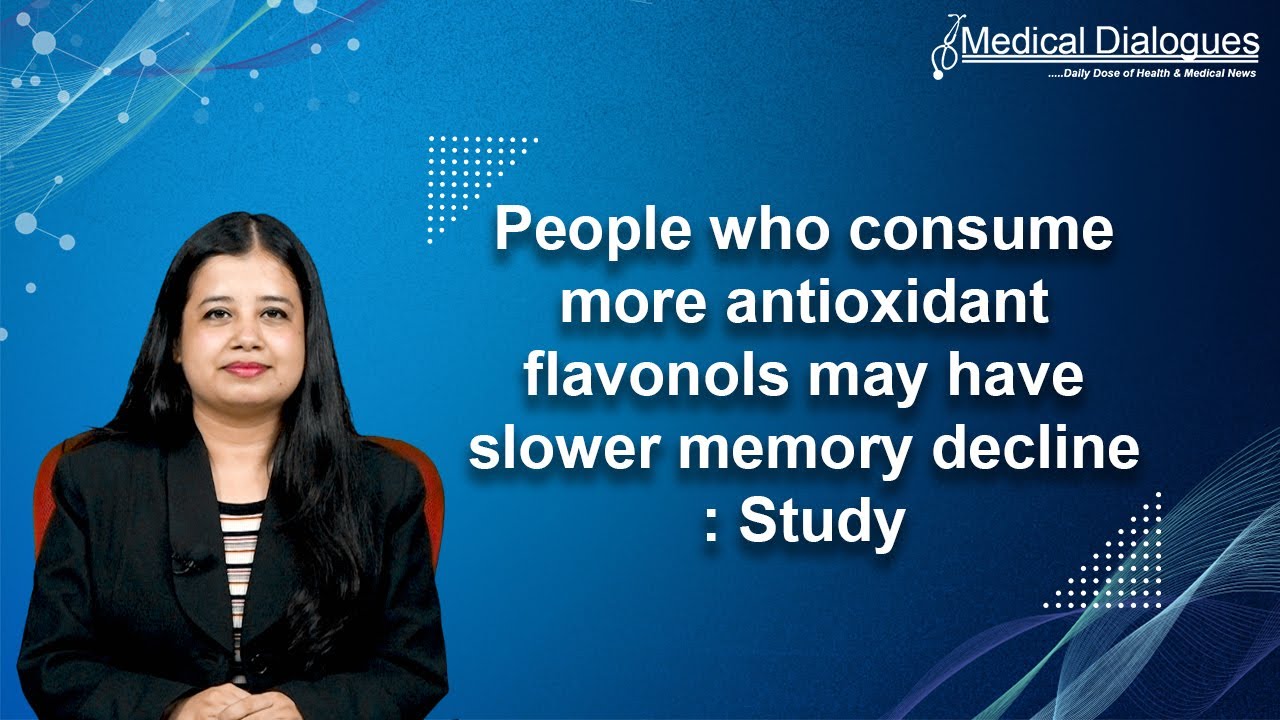New Study Finds That Consuming More Flavonol Rich Foods May Slow Down memory Decline
A study published in the online issue of $ Neurology®$ , the medical journal of the American Academy of Neurology, on November 22, 2022, found that consuming more flavonol rich foods may slow down memory decline.
Author:Suleman ShahReviewer:Han JuNov 24, 20227.9K Shares532.3K Views

A study published in the online issue of Neurology®, the medical journal of the American Academy of Neurology, on November 22, 2022, found that consuming more flavonol rich foods may slow down memory decline. The people who ate or drank more foods with antioxidant flavonols, which are found in several fruits and vegetables as well as tea and wine, may have a slower rate of memory decline.
Flavonols are a class of flavonoids, which are bioflavonoids present in a wide variety of plant foods including berries, nuts, cereals, fruits, and even tea and wine. These organic compounds are widely used in the pharmaceutical, therapeutic, cosmetic, and nutraceutical industries because to their beneficial effects on human health.
The Agricultural Research Service of the United States Department of Agriculture and the National Institute on Aging sponsored this study.

People who consume more antioxidant flavonols may have slower memory decline Study
81-Year-Olds As participants
A press release claims that 961 persons were involved in the research. With an average age of 81 and no signs of dementia, the participants were invited to fill out a food-frequency questionnaire. They also took cognitive and memory tests once a year, which included things like reciting lists of words and numbers in the proper sequence.
In addition, they inquired as to their degree of schooling, their regularity with reference to physical activity, and their exposure to cognitively energizing media like reading and gaming. On average, researchers kept tabs on participants for seven full years.
individuals were divided into five groups of similar size depending on the amount of flavonols in their meals.
Total flavonol consumption in the study cohort was about 10 mg per day, whereas the typical flavonol intake among US adults is between 16 and 20 mg per day. The top group consumed roughly the same as one cup of dark leafy greens per day (15 mg), whereas the lowest group consumed about half as much (5 mg).
The researchers used a global cognitive score, which included the outcomes of 19 different tests of cognition, to quantify the rates of cognitive loss. The average score was 0.5 for individuals without cognitive difficulties, 0.2 for those with moderate cognitive impairment, and - 0.5 for those with Alzheimer's disease.
When controlling for factors such as age, sex, and smoking, the cognitive score of those with the highest intake of flavonols declined at a rate 0.4 units per decade more slowly than that of those with the lowest intake.
“„It's exciting that our study shows making specific diet choices may lead to a slower rate of cognitive decline. Something as simple as eating more fruits and vegetables and drinking more tea is an easy way for people to take an active role in maintaining their brain health.- Thomas M. Holland, Rush University Medical Center in Chicago
Flavonols And Cognitive Deterioration
Kaempferol, quercetin, myricetin, and isorhamnetin were identified as the four components of the flavonol class in the research. Foods high in kaempferol include kale, beans, tea, spinach, and broccoli; foods high in quercetin include tomatoes, kale, apples, and tea; foods high in myricetin include tea, wine, kale, oranges, and tomatoes; and foods high in isorhamnetin include pears, olive oil, wine, and tomato sauce.
The rate of cognitive deterioration was 0.4 units per decade slower among individuals with the greatest consumption of kaempferol compared to those with the lowest intake. The rate of cognitive deterioration was 0.2 units per decade slower for individuals with the greatest consumption of quercetin compared to those with the lowest intake.
Furthermore, the rate of cognitive deterioration was 0.3 units per decade slower among the top myricetin consumers than in the lowest consumers. There was no correlation between dietary isorhamnetin and international IQ.
Although the researchers found a link between flavonol intake and a slower pace of cognitive decline, Holland emphasized that this did not imply that flavonols were the primary cause of the slower rate of decline.
The research had other caveats, such as the fact that the meal frequency questionnaire was self-reported, meaning that participants may not have properly recalled their dietary habits.
Final Words
The findings show that memory may decline less rapidly with age if the diet contains a high amount of total flavonols and numerous flavonol components.

Suleman Shah
Author
Suleman Shah is a researcher and freelance writer. As a researcher, he has worked with MNS University of Agriculture, Multan (Pakistan) and Texas A & M University (USA). He regularly writes science articles and blogs for science news website immersse.com and open access publishers OA Publishing London and Scientific Times. He loves to keep himself updated on scientific developments and convert these developments into everyday language to update the readers about the developments in the scientific era. His primary research focus is Plant sciences, and he contributed to this field by publishing his research in scientific journals and presenting his work at many Conferences.
Shah graduated from the University of Agriculture Faisalabad (Pakistan) and started his professional carrier with Jaffer Agro Services and later with the Agriculture Department of the Government of Pakistan. His research interest compelled and attracted him to proceed with his carrier in Plant sciences research. So, he started his Ph.D. in Soil Science at MNS University of Agriculture Multan (Pakistan). Later, he started working as a visiting scholar with Texas A&M University (USA).
Shah’s experience with big Open Excess publishers like Springers, Frontiers, MDPI, etc., testified to his belief in Open Access as a barrier-removing mechanism between researchers and the readers of their research. Shah believes that Open Access is revolutionizing the publication process and benefitting research in all fields.

Han Ju
Reviewer
Hello! I'm Han Ju, the heart behind World Wide Journals. My life is a unique tapestry woven from the threads of news, spirituality, and science, enriched by melodies from my guitar. Raised amidst tales of the ancient and the arcane, I developed a keen eye for the stories that truly matter. Through my work, I seek to bridge the seen with the unseen, marrying the rigor of science with the depth of spirituality.
Each article at World Wide Journals is a piece of this ongoing quest, blending analysis with personal reflection. Whether exploring quantum frontiers or strumming chords under the stars, my aim is to inspire and provoke thought, inviting you into a world where every discovery is a note in the grand symphony of existence.
Welcome aboard this journey of insight and exploration, where curiosity leads and music guides.
Latest Articles
Popular Articles